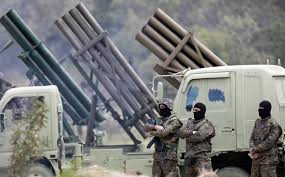
Introduction
Hezbollah, a Shiite militant group and political party based in Lebanon, has been a pivotal player in Middle Eastern geopolitics for decades. With ongoing conflicts in the region and its involvement in various political dynamics, understanding Hezbollah’s role is crucial for grasping the complexities of contemporary issues like Israeli security, Lebanese politics, and the wider Iranian influence in the region.
Current Developments
Recently, attention on Hezbollah has intensified due to the ongoing tensions between Israel and Palestinian groups. Following the outbreak of violence in Gaza in 2023, Hezbollah has publicly expressed its support for Palestinian resistance, resulting in sporadic cross-border skirmishes between its forces and the Israeli military. These incidents have raised concerns about the potential for a larger regional conflict involving multiple actors including Syria and Iran, both of which are known allies of Hezbollah.
In addition to military engagement, Hezbollah’s political influence remains significant. The group continues to participate in Lebanon’s fragile political system, with its members holding key positions in the Lebanese government. Hezbollah’s military prowess, coupled with its extensive social services network, adds to its legitimacy among many Lebanese citizens. However, it also earns criticism, particularly from groups who see Hezbollah as a destabilizing force in the country.
International Reactions and Implications
The international community is grappling with how to handle Hezbollah’s dual identity as a military organization and a political party. The United States and several European nations classify Hezbollah as a terrorist organization, which complicates diplomatic relations and humanitarian aid efforts in Lebanon. Conversely, nations like Russia and Iran maintain close ties with Hezbollah, underscoring the group’s strategic importance in regional power dynamics.
Conclusion
Hezbollah’s ongoing involvement in regional conflicts, combined with its political strategies within Lebanon, creates a complex scenario that has implications for regional security and international diplomacy. As tensions escalate in the Middle East, especially with the Israeli-Palestinian conflict, Hezbollah’s actions will likely continue to provoke debate over its role as a militant group versus a legitimate political player. Observers anticipate that Hezbollah will remain a significant factor in Middle Eastern geopolitics, influencing both local dynamics and international relations in the years to come.



